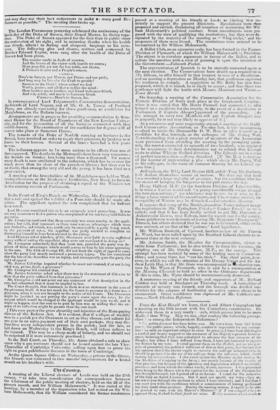In the Court of King ' s Bench, on Wednesday, Mr. Crompton
moved that a rule nisi against the validity of a Poor-rate should be made ab- solute. The appellant against the rate complained that he had not been rated.
Lord Denman considered this to be an extremely royal proceeding. It was not very common to find a person who complained uf his nut being held liable to pay rates. Mr. Crompton confessed that there certainly was some novelty in the appli- cation ; but said, that inasmuch as there were varietes aevautagea which were now derivable, and which, too, could only he exerciser' by a party being rated, by the payment of rates, the appellate: was justly entitled to complain on discovering himself to have been omitted in the toting. Lord Denman asked whether, if Me Overseers werelable to raise sufficient money without rating Me appellant, they were not warranted in doing so? Mr. Crompton submitted, that they were not, provided the party was de.. priced of those advantages which would accrue to him by his name appearing on the rate. The 17th of Ceorge III. did not limit the right of appeal to cases where the party bad merely sustained a pecuniary iejury. The law considered that the loss of the franchise was an injury, and consequently gave the party the right of appeal Mr. Justice Coleridge inquired whether he must not contend, Vett not being rated was, prima facie, a grievance?
Mr. Crompton did contend that.
Mr. Justice Coleridge asked what there was in the statement of this case to show that the party suffered from that grievance?
Mr. Crompton could not point out any statement of that description in the case, but submitted that it must be implied in law.
The Omit thought, that inasmuch as there was no statement in the ease of the grievance itself, it was too touch for the Court to presume that there WilS a grievance, when it was not brought to the notice of the Court. The Overseers might be justified in not putting the partys name upon the rate; for the amount which would be charged to the applicant would be very sa:ail, and it might so happen, that the sum to be paid by him was so ttifling that the ex- pense of its collection might be greater than the rate itself.
[This case proves the gross absurdity and injustice of the Rate-paying clauses of the Reform Act. It is evident, that if a clique of wealthy men in a parish get the Overseers to act as they choose, and submit for one year to an extra.payment out of their own pocks, they may dis- franchise every independent person in the parish ; ;and the law, as Lid down on Wednesday in the King's Bench, will refuse redress to the injured. This may be a cheap mode of bribery, and we should not be surprised if it were extensively practised.1 In the Bail Court, on Thursday, Mr. Amos obtained a rule to show cause why a quo warrant° should not be issued against the lute Vice- Chancellor of Cambridge University, calling upon him to prove his tight to grant publichouse licences in the town of' Cambridge.
At the Queen Square Office, on Weduesday, a private in'the Grena- dier Guards was sentenced to two months' imprisonment for a brutal assault on his brother's wife.


























 Previous page
Previous page